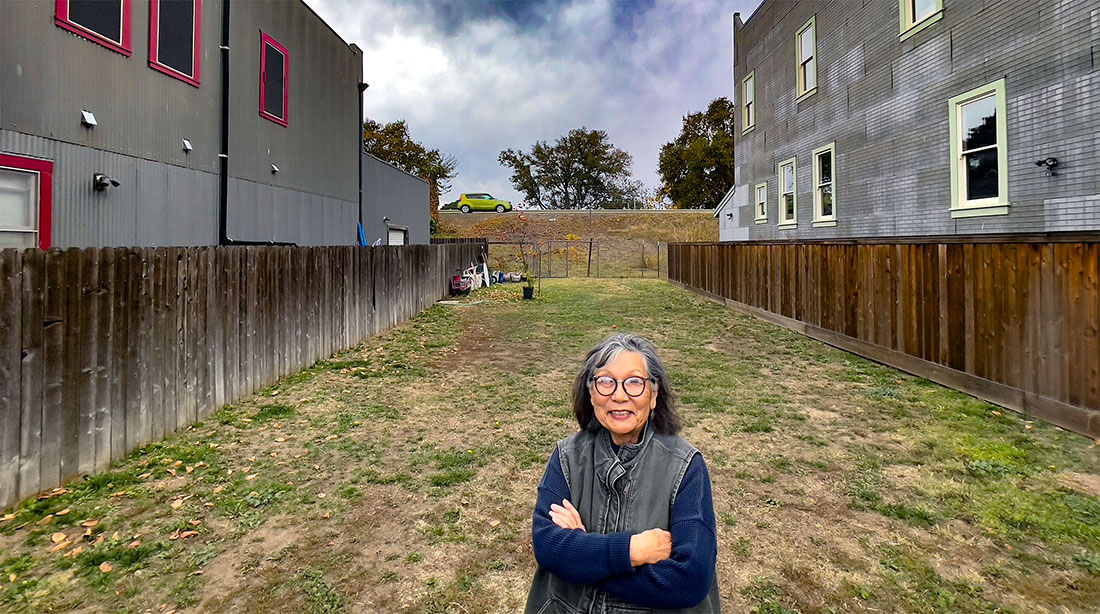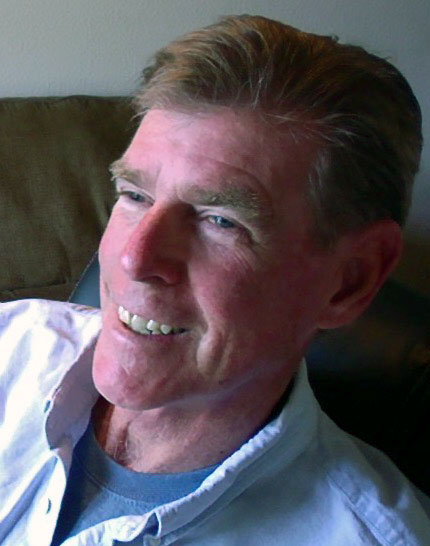From Vacant Lot to Cultural Centerpiece
Isleton's Asian Heritage Park Will Present Stories of Both Success and Hardship
- By Rich Hanner
- Photographs by Rich Turner
- March 19, 2024
- 8:49 pm
- No Comments

For many years, it has been a vacant lot, home to weeds and a lone Persimmon tree.
But this year, the nondescript space in downtown Isleton is being transformed. It’s becoming the Asian American Heritage Park, a place of remembrance and reflection.
The park will tell the stories of Chinese and Japanese immigrants who built Isleton – and much of the Delta.
A detailed vision of the park was prepared by the Mill Valley landscape and architectural firm of RHAA. A walkway will meander through a green and inviting space, a garden of sorts offering both historical and spiritual insights, recalling both the immigrants’ grit and the hardships they faced.
It is an ambitious project years in the making, a testament to the vision and tenacity of a dynamo named Jean Yokotobi. She is the president of the Isleton Chamber of Commerce, past president of the Isleton Historical Society, as well as the founder and publisher of Delta Life magazine.
For more than a half-century, she has carried on an abiding love affair with the village of Isleton.
She first visited the town in 1965 with friends. They cruised through the town in a convertible, and Yokotobi was enthralled. The town was bustling with shops, cafes, bars, canneries, packing sheds and boarding houses.
There were sumo wrestling tournaments, food bazaars, even a cultural parade.
The town had a unique design style with Asian flourishes and gray panels of pressed tin.
In her mind, there was nothing quite like it, anywhere.
“It was so beautiful, and so alive,” she said. “I knew I would live here one day.”
She became close to the Chinn family, prominent civic and business leaders in Isleton.
Though she was mesmerized by the town, her career in public health prevented Yokotobi from moving to Isleton until after she retired in 2004.
She has been a tireless champion of the town and its history since. She has purchased and renovated several properties in Isleton through the years; it is Yokotobi who donated the land for the heritage park.
Yokotobi began planning and pushing for a park nearly 15 years ago.
“She has been the driving force,” said Janet Sakata, who has helped review the informational features of the park. “She is a thinker and a communicator, but also a doer. She is a go-getter.”
An Asian tapestry
Founded in 1874, Isleton’s history is a tapestry woven by Asian communities.
In the 1800s, thousands of Chinese laborers came to California to mine gold and build railroads. Later, the Chinese created the sprawling system of levees that turned 500,000 acres of swampland into one of the most productive farming regions in the world.
After Chinese were excluded from immigrating to the U.S. in the 1880s, Japanese workers flowed into the Delta, many settling in Isleton. They were sent to internment camps in WWII, and after the war, few returned to Isleton. Portuguese and Filipinos arrived to help prune the grapes and harvest the pears.
Today, those populations have dwindled in Isleton and throughout the Delta, as have their businesses, schools and churches.

But Yokotobi remembers, remembers quite well. She thinks it’s important for others to celebrate those who built the town and made it, in the words of many, the toast of the Delta.
“I don’t want it to be just a park, but a place where people can be inspired by the history of this community,” said.
The site, at 27 Main Street, is next to the Bing Kong Tong building, once the social and cultural center of the Chinese community. The building now houses the Isleton Museum.
For many years, the lot was a playground for Chinese children. It is roughly 3,000 square feet, sitting smack dab in the center of Isleton, flanked by Main Street and Highway 160. The district is listed on the National Register of Historic Places. In 2019, the broader Delta region was named a National Heritage Area, the first such designation in California.
Hard lessons of bigotry
Informational panels will tell of accomplishment, but also hardship. Asians faced bigotry in many forms, including the Asian Exclusion Act of 1882 and Executive Order 9066, which called for locking up Japanese-Americans on the West Coast, whether they were U.S. citizens or not. Mention will be made of a darker side of Theodore Geisel, aka Dr. Suess, who drew blatantly racist anti-Asian political cartoons in the 1940’s.
A water feature is a centerpiece of the park, and will include artwork by Yoshio Taylor, a Sacramento-based sculptor and professor. One of his most notable works is a three-story waterfall tumbling down a wall at UC Davis.
A focal point is to be a compact Japanese temple, known as a Kansho-do, holding a bell used in Buddhist church services.
Yokotobi envisions the park as a place of learning – and quiet reckoning.
“You know, history is never pretty. So when you walk through the park you will read the history of Japanese and Chinese who lived in Isleton and I hope, you can meditate and think about what they lived through, and come to peace with it. I don’t want anyone to leave angry, but to understand that history is a reminder of our past and what we should not repeat.”
It’s hoped the park will help nourish a business and cultural renaissance in Isleton. Several new and renovated businesses have opened in recent months, including the Isleton Coffee Company, the Mei Wah Beer Room and Manny’s Barzzeria.
Moreover, many travelers are hungry to experience distinctive cultural and heritage settings, such as those in the Delta. And according to a feasibility study by Garavaglia Architecture, Chinese tourists are looking for minor jewels of cultural experience beyond the major attractions of San Francisco and Los Angeles.
The park is much-needed, said Douglas Hsia, who lives on Steamboat Slough in the Delta. “The history of Asians in the Delta is seldom presented. You talk to people, even in Sacramento and Elk Grove, and they have no idea,” said Hsia, who sits on the National Heritage Management Advisory Committee and is a director of the Locke Foundation board. “It’s very important that we continuously make efforts to tell these stories. The Isleton park will be a vital asset in allowing us to do that.”
Financial support for the park is coming through several sources, including a major grant from the Sacramento-San Joaquin Delta Conservancy. Much of the work by RHAA, and that of designer Lisa Suzanne Park, has been pro bono.
Several dedicated benches have been sold and commemorative bricks are still available.
Work is set to commence in March, led by Dave McNabb Construction based in Lafayette. The overall project, including the artistic contributions of Yoshio Taylor, is expected to take roughly six months.
Yokotobi lives in an upstairs apartment adjacent to the now-vacant lot, in a historic building she renovated, in the town she has loved and nurtured for more than a half-century.
Sometime in the late summer or fall of 2024, after a decade of planning and fundraising and advocating, she can look down and see a place of green.
A place where history is preserved and difficult lessons are learned.
A dream fulfilled.

Learning more –
To learn more about the Asian Heritage Park, visit deltaecs.org. The site includes information on how to purchase a memorial brick.

Rich Hanner is a freelance writer and editor based in Woodbridge. He may be reached at rhanner100@gmail.com.
- By Rich Hanner
- Photographs By: Rich Turner
- March 19, 2024
- 8:49 pm
- No Comments

Leave a Reply